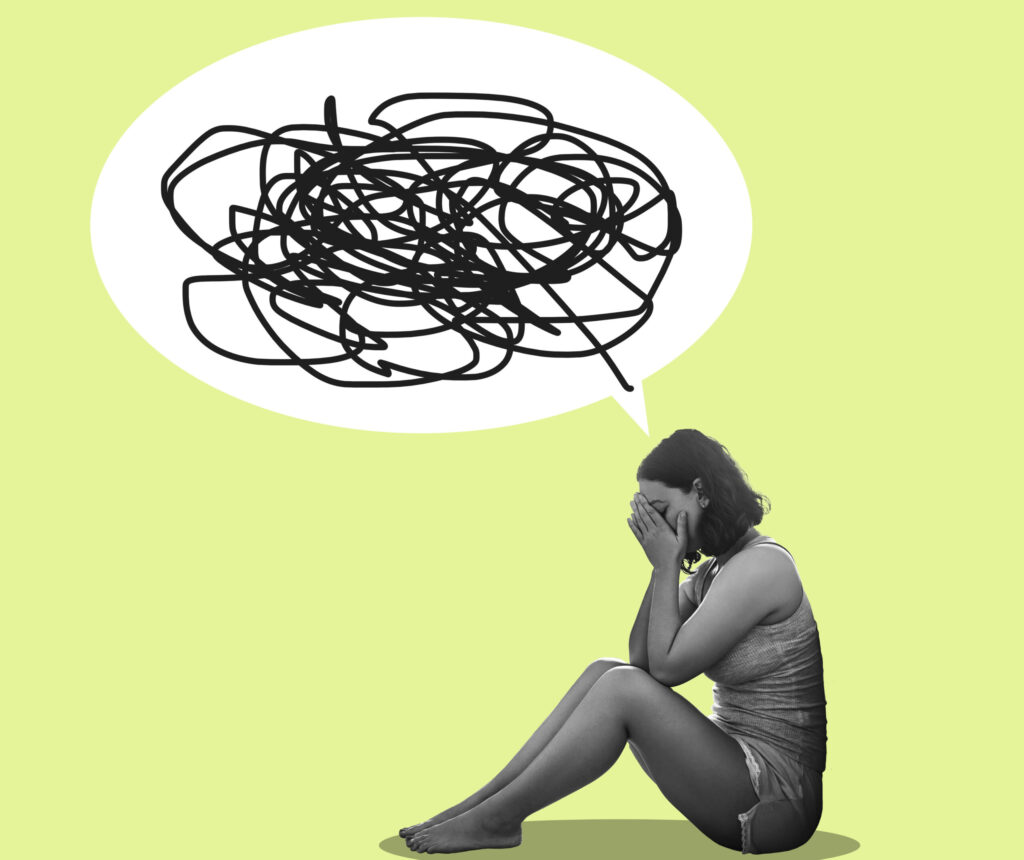Sex is messy. Between bodies touching, thoughts stirring, fluids mixing, and questions like ‘Am I doing this right?’, ‘Do they like this?’, or ‘Oh no, is that a wet spot?’ all cluttering the brain. It’s a complex experience for anyone.
Now add obsessive-compulsive disorder to the bedroom.
“One Dead Bedroom: Exploring the Lived Experience of Sex and Sexuality for Women with Self-Reported Obsessive-Compulsive Disorder” reveals how this disorder can complicate things between the sheets for women. Struggling with intense doubts about their sexual thoughts, anxiety, and triggers; Drs. Elicia Boulton and Victoria Clarke give us a real-life glimpse into how these mental battles impact sexual relationships.
Obsessive Compulsive Disorder
Affecting about 1-2 % of people, obsessive-compulsive disorder (OCD) is a mental health condition where someone experiences unwanted and distressing thoughts (obsessions). And then they feel compelled to perform repetitive behaviors (compulsions) to get rid of said thoughts.
Women are 1.6 times more likely to have OCD than men. They often experience significantly higher levels of depression and anxiety. And they’re more likely to have obsessions focused on contamination and cleaning.
These mental health struggles can spill into their intimate relationships, especially since women with OCD are more likely to be married. Making their struggles with sex and intimacy even more obvious.

Sex & OCD
Dr. Boulton and Dr. Clark studied 134 participants, primarily women, aged 18 and older recruited through online platforms like Reddit, Facebook, and Twitter. The participants had either self-reported as diagnosed with OCD or had sought treatment for it.
The researchers used a 10-question, online qualitative survey. The survey was designed to explore how OCD affected their thoughts and feelings about sex, their sexual identities, and their sexual experiences with their partners. The questions included: “Please tell me about any ways in which (if any) having OCD has impacted how you think and feel about sex” and “Please tell me about any impact (if any) OCD has had on your sexual partners and/or relationships.”
After collecting and analyzing the survey data, the doctors identified common patterns and themes among the women’s responses.
A Skewed Reality
OCD can make it incredibly difficult to tell the difference between their true sexual desires and their intrusive, unwanted thoughts. This battle to figure out their true selves can make the women feel deeply confused and distressed.
One woman shared how OCD caused them to doubt their sexuality, saying, “Whether or not it was my OCD talking or whether it was genuinely my preference. It was very confusing.” Another admitted their OCD convinced them they might be a lesbian, even though they weren’t sure.
“I just double myself so much and cannot trust how I feel because I don’t know what’s true.” (Isabel-2)
OCD can push women toward vulnerable experiences. Mira, a 22-year-old participant explained, “My sexual obsessions led me to be sexually assaulted while on a date with a man.” Further, one woman claimed their intrusive thoughts told them they were “made for sex and nothing more” which caused them to have sex with people they didn’t want to.
The mental torment of OCD made it difficult for many women to have sex or even think about it without intense shame and fear. The sexual anxiety was so severe for some that it caused panic attacks during intimacy. One participant confessed that “sometimes during sex, I get bad thoughts [that] enter my head” which would cause them to stop sex altogether. These intrusive thoughts were treated as if they were facts – negatively impacting their sexual relationships.
The Sexual Killjoy
OCD didn’t simply impact their thoughts, it controlled their sexual desires. Michaela, a 22-year-old, said, “OCD has made me want to avoid sex because of uncomfortable thoughts and images.” This anxiety would overshadow any potential enjoyment, turning what could be a pleasurable, positive experience into something terrifying.
Even solo activities like masturbation weren’t free from the pitfalls of OCD. While some of the women thought masturbation was “less risky and more controllable”, others avoided it altogether because of the intrusive thoughts and anxiety surrounding the sexual activity. Nicole, a 26-year-old woman admitted, “I feel like I cannot be a sexual person. I suffer most of my intrusive thoughts either during sex or in a sexual setting” turning them off completely.
Pressure Overrides Pleasure
Their intrusive thoughts and anxieties constantly complicated the participants’ sexual exploration. These experiences would leave them feeling disconnected from their own needs. Instead, they would hyper-focus on the sexual needs of their partners.
For example, Annie, a 32-year-old, felt extreme pressure to have anal sex because their partner preferred it. Despite Annie having severe contamination obsessions about fecal matter, they pushed themselves to “handle the obsession” and do it. Yet, they never told their partner how much they dreaded this sexual experience.
Obligatory sex was a common theme, which left the women feeling inadequate and abnormal. One woman simply stated, “I do it for my husband, not for me.” They often compared themselves to other people – which only increased their anxiety and reinforced their struggles with OCD and sex.

You’re Not Helping
When it came to therapy, the women felt it was a challenge to talk about how OCD impacted their sex lives. Fear of judgment from the therapists was a common concern. A 26-year-old, named Alex, admitted, “I’ve been too ashamed to talk about it or really seek help.”
Even when they tried to bring it up, the women often encountered therapists who were uncomfortable or unprepared to discuss it. Annie shared, “My current therapist never mentions the topic, and even when I have tried… she seems to shy away from it.” This subject avoidance only added to the participants’ feelings of shame and isolation.
The lack of understanding led some of them toward misdiagnosis and even more distress. Mira went to therapy after their sexual assault and was told by their therapist that they were homosexual because of their OCD thoughts.
Already hyper-judgmental of themselves, the women wanted a therapist they could trust – not someone else to bring more judgment into the mix.
Therapy, But Better
Based on the experiences of the women, the study revealed a significant gap in the way therapy is currently practiced, specifically concerning OCD and sexuality. The researchers suggest that therapists need to create a more open, non-judgmental space where these discussions are encouraged, rather than avoided. They emphasized that therapists need to be trained to recognize OCD-related intrusive thoughts and understand their impact on sex lives.
The doctors pointed out that therapists must avoid giving advice that reinforces bedroom gender stereotypes. For example, Bella, a 25-year-old, had been told to “lie back and think of [other] things” during sex by their therapist.
Therapists should start the conversation about sex and sexuality in sessions, rather than wait for the client to bring it up. By doing this, they can help ease the shame and fear surrounding the topic.

Going Forward
Dr. Boulton and Dr. Clarke stress the need for more research on how OCD impacts sex and relationships. They recommend that future studies explore a wider range of sexual activities and consider challenges faced by straight and queer women with OCD. Further, we need more diverse samples, because this study was 85% white-identifying participants.
It’s important to recognize that therapists may lack the training needed to address these sensitive challenges. However, it’s not only about giving them better resources; women with OCD must also speak up about their experiences especially when it comes to how OCD affects their sex lives. Far too often, women are conditioned to “please others” and “prioritize others’ emotional needs,” sacrificing their own desires. So, if you’re struggling with OCD, seek help. Look for a therapist who really understands the nuances of obsessive-compulsive disorder and its impact on sexuality.
In the end, sex is a spectrum – as long as it’s consensual and pleasurable – who are we to define how satisfying someone’s intimacy is? As these experiences show, sex is messy, but that’s okay. The messiness is the part that makes it real.



